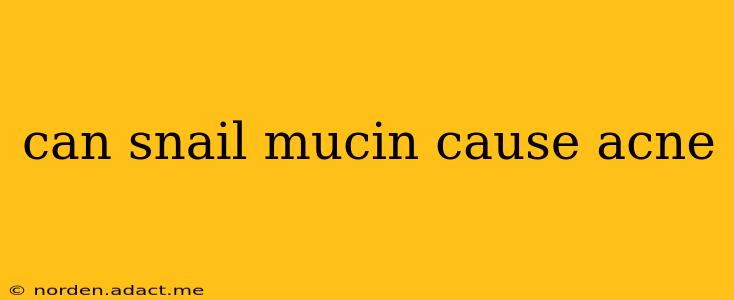Snail mucin, a secretion produced by snails, has surged in popularity as a skincare ingredient, touted for its purported ability to hydrate, soothe, and even reduce acne scars. However, the question remains: can snail mucin cause acne? The answer, like many things in skincare, is nuanced and not a simple yes or no.
While anecdotal evidence exists on both sides of the argument, scientific research is still limited. The truth is, snail mucin's impact on acne varies significantly depending on individual skin types, the specific product formulation, and the underlying cause of the acne.
What is Snail Mucin and What Does it Do?
Snail mucin is rich in beneficial components like hyaluronic acid, glycolic acid, and allantoin. These ingredients contribute to its purported benefits:
-
Hydration: Hyaluronic acid is a powerful humectant, drawing moisture into the skin. This increased hydration can improve skin barrier function, potentially reducing inflammation and sensitivity – factors that can contribute to acne.
-
Anti-inflammatory Properties: Allantoin possesses soothing and anti-inflammatory qualities, which might help calm irritated skin and reduce redness associated with acne breakouts.
-
Exfoliation: Glycolic acid is an alpha-hydroxy acid (AHA) that gently exfoliates the skin, removing dead skin cells that can clog pores. This exfoliating action can help prevent future breakouts.
-
Wound Healing: Snail mucin contains proteins and copper peptides thought to promote wound healing, potentially aiding in the repair of acne scars.
Can Snail Mucin Cause Acne Breakouts?
While snail mucin generally promotes healthy skin, it's not without the potential for causing breakouts in some individuals. This can be due to several factors:
-
Individual Skin Sensitivity: Some people may be allergic or sensitive to components within snail mucin, leading to irritation, redness, and breakouts. Patch testing a small area before applying it to the entire face is crucial.
-
Comedogenicity: While generally considered non-comedogenic (unlikely to clog pores), the specific formulation of a snail mucin product matters. If combined with other comedogenic ingredients, it could potentially contribute to blocked pores. Always check the full ingredient list.
-
Contamination: Improperly processed or contaminated snail mucin products can introduce bacteria or other irritants to the skin, leading to breakouts. Choosing reputable brands with high-quality ingredients is essential.
H2: Does Snail Mucin Help With Existing Acne?
While it might not directly treat acne, snail mucin’s anti-inflammatory and wound-healing properties could potentially help soothe existing acne and reduce the appearance of scars. However, it's not a replacement for acne treatments prescribed by a dermatologist.
H2: Is Snail Mucin Suitable for All Skin Types?
No, snail mucin isn't universally suitable. Individuals with sensitive skin should proceed with caution and perform a patch test. Those with active, severe acne should consult a dermatologist before incorporating it into their skincare routine.
H2: How Can I Use Snail Mucin Safely?
- Patch Test: Always perform a patch test on a small area of skin before applying it to your entire face.
- Choose Reputable Brands: Opt for products from reputable brands with transparent ingredient lists and manufacturing processes.
- Start Slowly: Begin by using snail mucin sparingly, gradually increasing frequency as tolerated.
- Observe Your Skin: Monitor your skin's reaction closely. If you notice any adverse reactions like irritation or breakouts, discontinue use immediately.
- Consult a Dermatologist: If you have severe acne or other skin conditions, consult a dermatologist before using snail mucin.
Conclusion:
Snail mucin's potential to cause acne depends on several factors. While its beneficial properties can contribute to healthy skin, its suitability varies depending on individual skin sensitivities and product formulation. A cautious approach, including patch testing and careful product selection, is crucial to minimize the risk of adverse reactions. For effective acne treatment, a dermatologist's guidance remains paramount.
